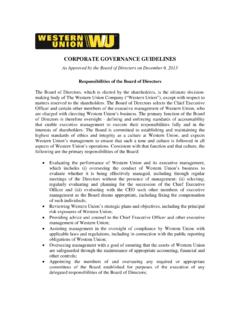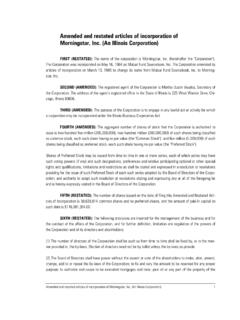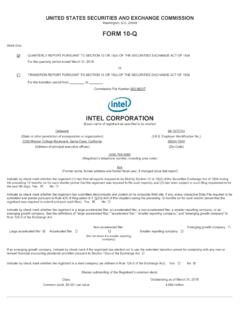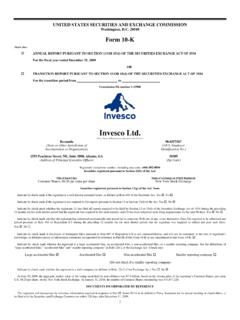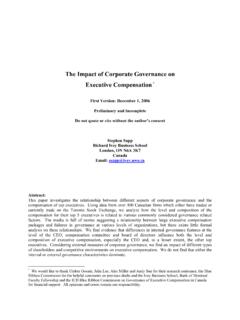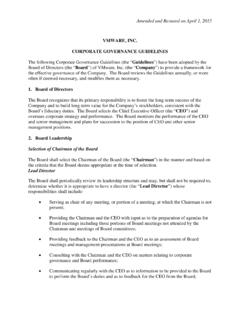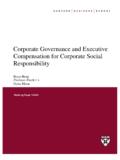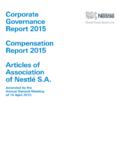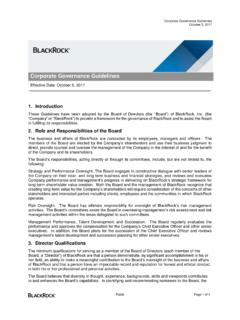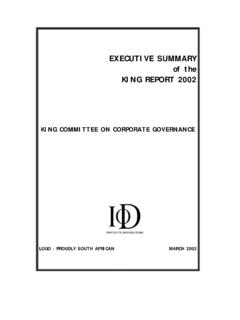Transcription of PFIZER INC. CORPORATE GOVERNANCE …
1 PFIZER INC. CORPORATE GOVERNANCE principles role and composition of the Board of Directors 1. General. The Board of Directors (the Board), which is elected by the shareholders, is the ultimate decision-making body of PFIZER Inc. (the Company), except with respect to those matters reserved to the shareholders. It selects the Chief Executive Officer and other members of the senior management team, which is charged with the conduct of the Company s business. Having selected the senior management team, the Board acts as an advisor and counselor to senior management and ultimately monitors its performance. The function of the Board to monitor the performance of senior management is facilitated by the presence of non-employee Directors of stature who have substantive knowledge of the Company s business.
2 2. Succession Planning. The Board is responsible for planning for succession to the position of Chief Executive Officer as well as certain other senior management positions. To assist the Board, the Chief Executive Officer shall annually provide the Board with an assessment of other senior managers and their potential to succeed him or her. He or she shall also provide the Board with an assessment of persons considered potential successors to certain senior management positions. 3. Board Leadership. The independent Directors will annually elect a Chairman of the Board, who may or may not be the Chief Executive Officer of the Company, based on the recommendation of the CORPORATE GOVERNANCE Committee as a result of its annual review of the Company s Board leadership structure.
3 If the individual elected as Chairman of the Board is the Chief Executive Officer, the independent Directors shall also elect a Lead Independent Director. The Chairman of the Board shall preside at all meetings of the shareholders and of the Board as a whole, as well as over executive sessions of the independent Directors, and shall perform such other duties, and exercise such powers, as from time to time shall be prescribed in the Company s By-laws or by the Board; provided that the Lead Independent Director, if any, shall preside over executive sessions of the Company s independent Directors. In addition, the Lead Independent Director, if any, shall facilitate information flow and communication among the Directors and perform such other duties as may be specified by the Board and outlined in the Charter of the Lead Independent Director.
4 The Board shall consider the rotation of the Lead Independent Director, if any, at such intervals as the Board determines on the recommendation of the CORPORATE GOVERNANCE Committee. 4. Director Independence. It is the policy of the Company that the Board consist of a majority of independent Directors. The CORPORATE GOVERNANCE Committee of the Board has established Director Qualification Standards to assist it in determining Director independence, which either meet or exceed the independence requirements of the New York Stock Exchange (NYSE) CORPORATE GOVERNANCE listing standards. The Board will consider all relevant facts and circumstances in making an independence determination, and not merely from the standpoint of the Director, but also from that of persons or organizations with which the Director has an affiliation.
5 5. Board Size. It is the policy of the Company that the number of Directors not exceed a number that can function efficiently as a body. The CORPORATE GOVERNANCE Committee shall periodically consider and make recommendations to the Board concerning the appropriate size and needs of the Board. The CORPORATE GOVERNANCE Committee considers candidates to fill new positions created by increases in the size of the Board and vacancies that occur by resignation, by retirement or for any other reason. 6. Selection Criteria. To be considered for membership on the Board, candidates should be individuals of proven integrity with a record of substantial achievement in an area of relevance to the Company. In selecting Directors, the Board will generally seek leaders of major complex organizations, including within the scientific, government service, educational, finance, marketing, technology and the not-for-profit sectors.
6 In addition, the Board also will seek some Directors who are widely recognized as leaders in the fields of medicine or the biological sciences. Candidates must have demonstrated ability and sound judgment. A candidate must also possess a judicious and critical temperament that will enable objective appraisal of management s plans and programs. Each Director is expected to serve the best interests of all shareholders and must be committed to enhancing long-term Company growth. Directors should be selected so that the Board of Directors is a diverse body, with diversity reflecting gender, ethnic background and professional experience. Candidates considered by the CORPORATE GOVERNANCE Committee shall also be considered by other Directors, based on the recommendation of the CORPORATE GOVERNANCE Committee, and final approval of a candidate shall be determined by the full Board.
7 Recommendations for Directors received from shareholders will be evaluated in accordance with the criteria set forth above. 7. Voting for Directors. In accordance with the Company s By-laws, unless the Secretary of the Company determines that the number of nominees exceeds the number of Directors to be elected as of the record date for any meeting of the shareholders, a nominee must receive more votes cast for than against his or her election or re-election in order to be elected or re-elected to the Board. The Board expects a Director to tender his or her resignation if he or she fails to receive the required number of votes for re-election. The Board shall nominate for election or re-election as Director only candidates who agree to tender, promptly following such person s failure to receive the required vote for election or re-election at the next shareholder meeting at which such person would face election or re-election, an irrevocable resignation that will be effective upon Board acceptance of such resignation.
8 In addition, the Board shall fill Director vacancies and new directorships only with candidates who agree to tender, promptly following their appointment to the Board, the same form of resignation tendered by other Directors in accordance with this CORPORATE GOVERNANCE Principle. If an incumbent Director fails to receive the required vote for re-election, then, within 90 days following certification of the shareholder vote, the CORPORATE GOVERNANCE Committee will act to determine whether to accept the Director s resignation and will submit such recommendation for prompt consideration by the Board, and the Board will act on the Committee s recommendation. The CORPORATE GOVERNANCE Committee and the Board may consider any factors they deem relevant in deciding whether to accept a Director s resignation.
9 - 2 - Any Director who tenders his or her resignation pursuant to this provision shall not participate in the CORPORATE GOVERNANCE Committee recommendation or Board action regarding whether to accept the resignation offer. Thereafter, the Board will promptly disclose its decision-making process and decision regarding whether to accept the Director s resignation offer (or the reason(s) for rejecting the resignation offer, if applicable) in a Current Report on Form 8-K (or any successor report) furnished to the Securities and Exchange Commission. If each member of the CORPORATE GOVERNANCE Committee fails to receive the required vote in favor of his or her election in the same election, then those independent Directors who did receive the required vote shall appoint a committee amongst themselves to consider the resignation offers and recommend to the Board whether to accept them.
10 However, if the only Directors who receive the required vote in the same election constitute three or fewer Directors, all Directors may participate in the action regarding whether to accept the resignation offers. 8. Director Service on Other Public Boards. Ordinarily, Directors should not serve on more than four other boards of public companies in addition to the Company s Board. 9. Former Chief Executive Officer as Director. Upon retirement from the Company, the former Chief Executive Officer will not retain Board membership. 10. Change in Director Occupation. When a Director s principal occupation or business association changes substantially during his or her tenure as a Director, that Director shall tender his or her resignation for consideration by the CORPORATE GOVERNANCE Committee.
